#pynchon
Link
“Imagine a version of the contemporary web laid out before us, like Gibson’s cyberspace or Stephenson’s Metaverse. Picture an endless plateau, planed flat, with aloof skyscrapers: a gleaming city in draft, a Dubai dispersed. That giant #1 on the horizon is YouTube, that tower of shipping boxes, Amazon. Smaller structures suggest modest websites: businesses, blogs, and more. The buildings roll away, as regular as dominoes, around the horizon. Occasional fissures, venting steam, allude to the catacombs of the dark web.
In this vision, your browser is a pod. You punch in coordinates and zip around at light-speed, passing smoothly through other browsers, whose hulls turn transparent at your approach, as in the Metaverse. Hyperlinks are wormholes: tunnels of swirling light.
One wormhole wings your pod across a digital Atlantic and deposits you in front of a quaint green building on the banks of a pixelated river. Other quaint buildings surround it but are spaced apart to accommodate pods. (It’s as if someone clicked on the edge of a city and dragged it, distending space itself.) You are now at the online shop for Shakespeare and Company, on the banks of the Seine in Paris. It’s never closed, and the door is decoration: you float cleanly through it.”
As social media becomes an increasingly fraught landscape, Jason Guriel’s ode to the bookstore reminds us of an older form of browsing—one rooted in a sense of place. “I Remember the Bookstore” is an excerpt from Jason’s new book On Browsing, which will be published on November 15, 2022, by Biblioasis Publishing.
181 notes
·
View notes
Text

12 notes
·
View notes
Note
How do you read Gravity’s Rainbow? I’ve tried a few times but I can never follow what’s happening, I don’t get it at all. Honestly it makes me feel stupid lol. Is there something I should read before or a guide or something? Thank you!
well first off you shouldn’t feel stupid for having trouble with it, almost everyone does! I think fans mostly agree that the first part of the book is the toughest, deliberately: no spoiler but the effect of the first part is very much the whole “oh now that I’m on the second time around I get all of this oh wow” kind of thing. I know that’s tough to stomach for 150 pages on the first part
The thing with Pynchon, and especially with this part, is that to some degree you have to be open to just going for the ride. You *can* follow the plot in the opening, it just might be difficult because of all the acronyms and the sudden shifts in perspective. For me GR is a lot like a comic book: if you try to imagine each paragraph as like a panel, the shifts don’t seem so outrageous (Pynchon himself is thinking of film, which is why sometimes the narrative voice literally includes camera instructions). You might be confused about “what’s really happening” and what’s not, but don’t worry, it’ll become clearer (well…yeah it will).
for books to read before, there’s a lot of stuff you could read that might enhance your enjoyment (Rilke, the autobiography of Malcolm X, Ouspensky, the list goes on…tbh the most essential would probably be watching some Fritz Lang movies, like Metropolis and M) but nothing necessary if you want to read GR. You could do Pynchon’s first book V if you want to—-some of the characters in GR started there, it’s similar but much easier to read if you’re super nervous—-but you don’t really have to.
anyway the last thing is, the reason Pynchon fans love him so much is because he has a very unique voice, style, and sense of humor. What that also means is that you might just not like what he’s doing, and that’s fine! Don’t torture yourself to get through it and don’t use it to insult yourself: it’s supposed to be fun
also this site includes bare chapter summaries that you can read before each section if you’re nervous and want to make sure you hit the major stuff. I’m pretty sure I used a version of it when I first read it
#asks#Pynchon#thank you anon! Sorry for the long answer! If you’re having trouble with anything feel free to ask
19 notes
·
View notes
Text

9 notes
·
View notes
Photo
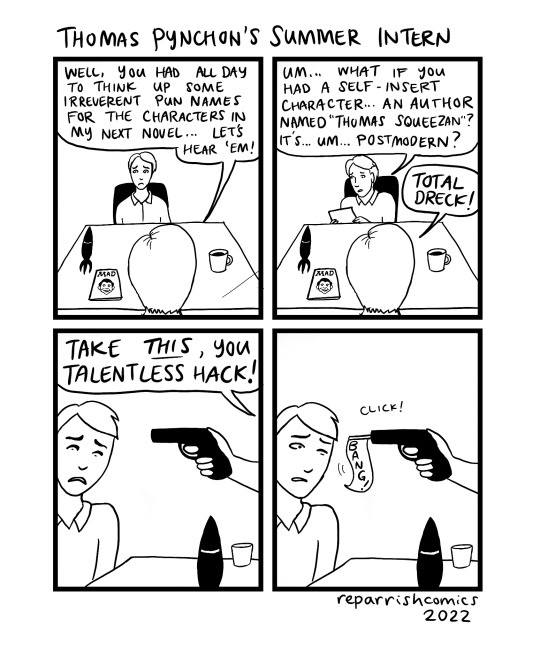
( Facebook / Twitter / Instagram / RedBubble / Buy Me A Coffee )
#thomas pynchon#pynchon#gravity's rainbow#the crying of lot 49#mason and dixon#vineland#against the day#v.#bleeding edge#inherent vice#postmodernism#American literature#literature#comic#comics
69 notes
·
View notes
Text
Gee, uh, don't I kn-know it.
"Say, Doc, you ever use ChatGPT?"
"Does it know where I can score?"
*Cue Porky Pig's Loony Tunes outro.
10 notes
·
View notes
Text
I've always been on the fence on whether I wanted to read any more of Pynchon
It's "jokey, playful, readable" vs. "huge, rambling, pretentious, extremely long" -- and I have often been disappointed in my attempts to delve into the second camp
But it's funny, there are these moments when he reaches the right level of craziness -- like when Gravity's Rainbow has all those footnotes, and I don't know, I really love those footnotes. They're genuinely hilarious. They're weirdly funny and affecting. I would keep reading even if I didn't like the rest, I would keep reading just because the footnotes are a constant source of joy
And then I think, wait, should I be reading a book if there's a constant source of joy, but the rest of the book is not-joyous? Do I really want to read an entire Pynchon novel where I get nothing out of the novel except the occasional footnote?
2 notes
·
View notes
Quote
“Fuck you,” whispers Slothrop. It’s the only spell he knows, and a pretty good all-purpose one at that.
Thomas Pynchon, Gravity’s Rainbow (pt. 2, ch. 2)
17 notes
·
View notes
Photo
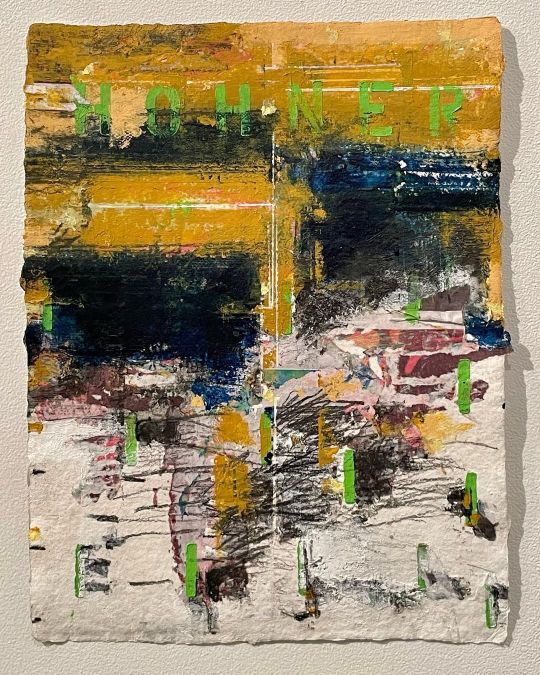
The final #drawing… referencing #Pynchon’s protagonist Tyrone Slothrop only at the end, as he disintegrates, leaving only his instrument of choice, and the film jumps the projection gate. . #MindlessPleasures 73. #MixedMedia & #collage transfer on #paper, 12” x 9” . #art #contemporaryart #abstractart #textart #contemporarypainting #contemporarydrawing #ThomasPynchon #GravitysRainbow https://www.instagram.com/p/CiDKp6brCHx/?igshid=NGJjMDIxMWI=
#drawing#pynchon#mindlesspleasures#mixedmedia#collage#paper#art#contemporaryart#abstractart#textart#contemporarypainting#contemporarydrawing#thomaspynchon#gravitysrainbow
7 notes
·
View notes
Text
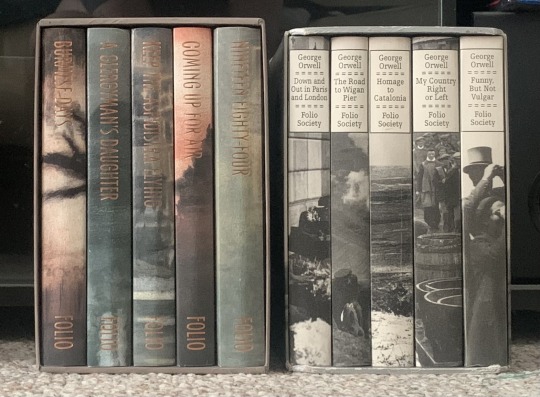
“Though 1984 has brought aid and comfort to generations of anticommunist ideologues with Pavlovian-response issues of their own, Orwell's politics were not only of the left, but to the left of left. He had gone to Spain in 1937 to fight against Franco and his Nazi-supported fascists, and there had quickly learned the difference between real and phony antifascism. "The Spanish war and other events in 1936-7," he wrote 10 years later, "turned the scale and thereafter I knew where I stood. Every line of serious work that I have written since 1936 has been written, directly or indirectly, against totalitarianism and for democratic socialism, as I know it."
Now, those of fascistic disposition - or merely those among us who remain all too ready to justify any government action, whether right or wrong - will immediately point out that this is prewar thinking, and that the moment enemy bombs begin to fall on one's homeland, altering the landscape and producing casualties among friends and neighbours, all this sort of thing, really, becomes irrelevant, if not indeed subversive. With the homeland in danger, strong leadership and effective measures become of the essence, and if you want to call that fascism, very well, call it whatever you please, no one is likely to be listening, unless it's for the air raids to be over and the all clear to sound. But the unseemliness of an argument - let alone a prophecy - in the heat of some later emergency, does not necessarily make it wrong. One could certainly argue that Churchill's war cabinet had behaved on occasion no differently from a fascist regime, censoring news, controlling wages and prices, restricting travel, subordinating civil liberties to selfdefined wartime necessity.
(…)
Prophecy and prediction are not quite the same, and it would ill serve writer and reader alike to confuse them in Orwell's case. There is a game some critics like to play in which one makes lists of what Orwell did and didn't "get right". Looking around us at the present moment in the US, for example, we note the popularity of helicopters as a resource of "law enforcement," familiar to us from countless televised "crime dramas," themselves forms of social control - and for that matter at the ubiquity of television itself. The two-way telescreen bears a close enough resemblance to flat plasma screens linked to "interactive" cable systems, circa 2003. News is whatever the government says it is, surveillance of ordinary citizens has entered the mainstream of police activity, reasonable search and seizure is a joke. And so forth. "Wow, the government has turned into Big Brother, just like Orwell predicted! Something, huh?" "Orwellian, dude!"
Well, yes and no. Specific predictions are only details, after all. What is perhaps more important, indeed necessary, to a working prophet, is to be able to see deeper than most of us into the human soul. Orwell in 1948 understood that despite the Axis defeat, the will to fascism had not gone away, that far from having seen its day it had perhaps not yet even come into its own - the corruption of spirit, the irresistible human addiction to power were already long in place, all well-known aspects of the Third Reich and Stalin's USSR, even the British Labour party - like first drafts of a terrible future. What could prevent the same thing from happening to Britain and the United States? Moral superiority? Good intentions? Clean living?
(…)
Orwell was amused at those of his colleagues on the left who lived in terror of being termed bourgeois. But somewhere among his own terrors may have lurked the possibility that, like Galsworthy, he might one day lose his political anger, and end up as one more apologist for Things As They Are. His anger, let us go so far as to say, was precious to him. He had lived his way into it - in Burma and Paris and London and on the road to Wigan pier, and in Spain, being shot at, and eventually wounded, by fascists - he had invested blood, pain and hard labour to earn his anger, and was as attached to it as any capitalist to his capital. It may be an affliction peculiar to writers more than others, this fear of getting too comfortable, of being bought off. When one writes for a living, it is certainly one of the risks, though not one every writer objects to. The ability of the ruling element to co-opt dissent was ever present as a danger - actually not unlike the process by which the Party in 1984 is able perpetually to renew itself from below.” - Thomas Pynchon, ‘The Road to 1984’ (The Guardian, 3 May 2003)
17 notes
·
View notes
Text

#philosophy#quotes#Thomas Pynchon#Gravity’s Rainbow#Pynchon#society#power#questions#answers#oppression
6 notes
·
View notes
Text
Any discussion of Sloth in the present day is of course incomplete without considering television, with its gifts of paralysis, along with its creature and symbiont, the notorious Couch Potato. Tales spun in idleness find us Tubeside, supine, chiropractic fodder, sucking it all in, re-enacting in reverse the transaction between dream and revenue that brought these colored shadows here to begin with so that we might feed, uncritically, committing the six other deadly sins in parallel, eating too much, envying the celebrated, coveting merchandise, lusting after images, angry at the news, perversely proud of whatever distance we may enjoy between our couches and what appears on the screen.
Sad but true. Yet, chiefly owing to the timely invention -- not a minute too soon ! -- of the remote control and the VCR, maybe there is hope after all. Television time is no longer the linear and uniform commodity it once was. Not when you have instant channel selection, fast-forward, rewind and so forth. Video time can be reshaped at will. What may have seemed under the old dispensation like time wasted and unrecoverable is now perhaps not quite as simply structured. If Sloth can be defined as the pretense, in the tradition of American settlement and spoliation, that time is one more nonfinite resource, there to be exploited forever, then we may for now at least have found the illusion, the effect, of controlling, reversing, slowing, speeding and repeating time -- even imagining that we can escape it. Sins against video time will have to be radically redefined.
-Thomas Pynchon, “Nearer, My Couch, To Thee”
#pynchon#tv#television#time#temporality#idleness#attention#sloth#laziness#couch potato#king of spuds#media#image#narrative
2 notes
·
View notes
Photo
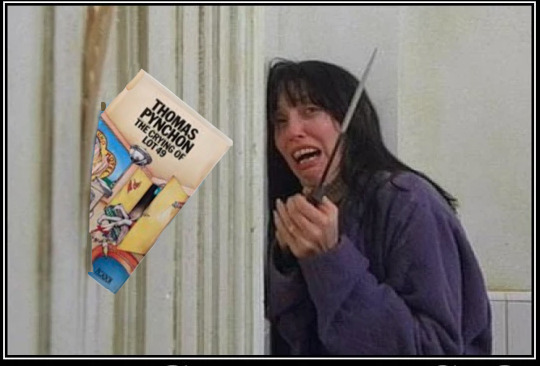
Fell asleep and had vivid nightmares about being in college again.
4 notes
·
View notes
Photo
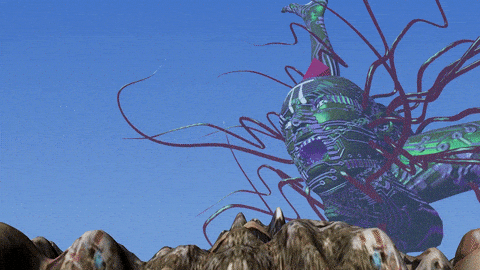
(via GIPHY)
2 notes
·
View notes
Text
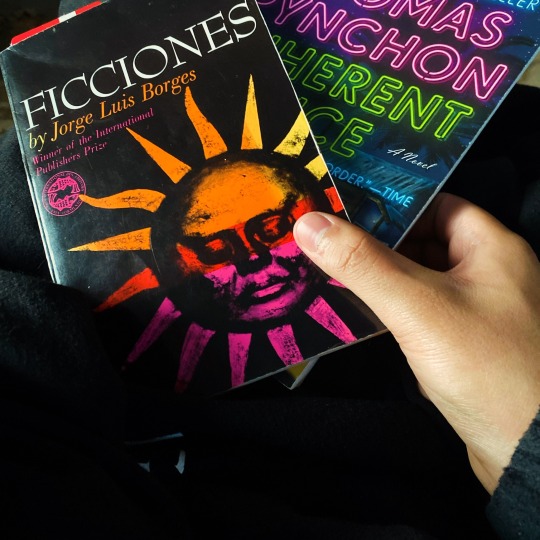
The 2 books I’ve been reading lately
1 note
·
View note
